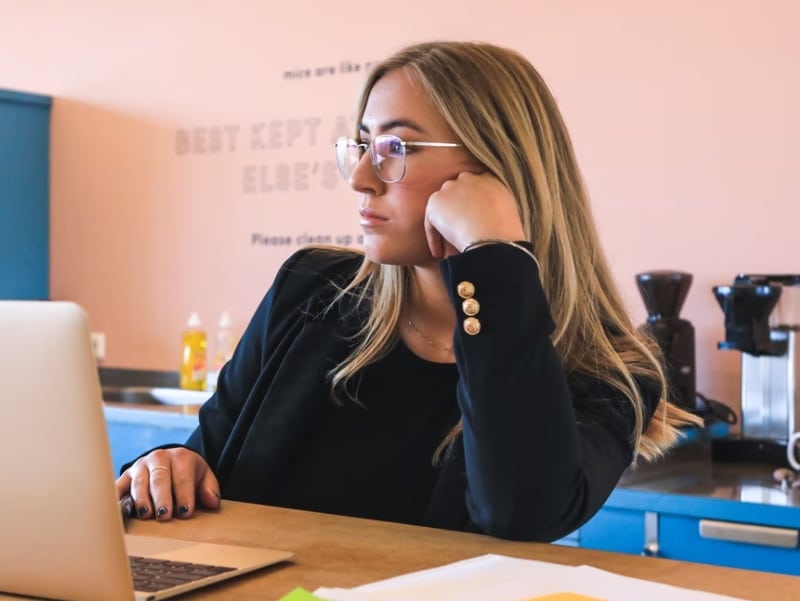You have made up your mind, but wait! There it is again. It’s that little voice inside your head saying, “Are you sure that was the right choice?” If you’re like me and have a particular knack for second-guessing yourself, it can be easy to get caught in a second-guessing frenzy over even the simplest of decisions.
But there is a big problem with second-guessing yourself. Doubting yourself repeatedly strips you of your sense of control leaving you feeling anxious and insecure. This was the motivation I needed to start figuring out exactly how to stop this habit of second-guessing myself.
In this article, we will explore how you can stop second-guessing yourself and start to trust your decision-making skills again starting today.
Why do you second-guess yourself?
Many people will second guess themselves because they lack confidence or feel a sense of anxiety about making “the wrong choice.” And it’s not the choice itself that is the problem, but rather the perceived consequences of that choice.
We play the “what ifs” of a given scenario on repeat in our heads trying to figure out the best option that will lead us to happiness. It’s only natural to want the best outcome and to avoid pain.
And sometimes second-guessing yourself isn’t a bad thing. What do I mean by this? Well, sometimes second-guessing means we are stopping to be more self-aware of the effects of a decision.
You know that moment when your friend is trying on an outfit and you think, “Honestly, the dress does make your butt look big”. Taking a moment to second guess whether you should say this out loud could save your friendship.
The downsides of second-guessing yourself
On the flip side of the coin, research studies show that chronically second-guessing yourself may lead you into an emotional trap where you feel anxious and procrastinate.
When you constantly doubt yourself and your decisions, you start to feel like you don’t have control over your life. This is how second-guessing can lead to depression and lower your self-esteem.
And to add insult to injury, a study performed in 2018 found that revising your initial decision makes it less likely for you to have made the accurate choice. So not only does second-guessing cause your mental health to suffer, but it also makes you prone to not making the “best choice”.
5 tips to keep you from second-guessing
After all that bad news, don’t you think it’s time that we talk about something positive? Me, too! The silver lining is there are ways that you can stop yourself from second-guessing starting now.
1. Realize there is often not “one right answer”
We often assume that there is a best option or a “right answer” when it comes to making a choice. And while there are circumstances where this may be true, oftentimes there is more than one choice that will give you the desired outcome.
I remember when I was stuck between choosing one of two jobs. I made a pros and cons list that was a mile long. Every night for a week, I would triumphantly choose one, and then seconds later I would take back my decision.
Then one night my husband said, “Don’t you think either one would be a good option?” My first thought was, “Wow babe, so helpful…”. But much to my chagrin, it hit me that he was right. I could be happy with either position. So why was I wasting so much time going back and forth in my head second-guessing myself?
2. Embrace failure
Yuck! Who likes to embrace failure? Well, unfortunately, it is an inevitable part of existing on planet earth.
But what you do control is your perspective on failure. Every time you fail, you are learning something. A failure is a form of feedback that can help guide your future decisions.
If you can become more comfortable with the potential of failing, you can free yourself from the burden of thinking “what if I fail” when making a decision. So what if you fail or make the “wrong choice”? Then you try again!
The world will not end if you fail to make the best decision. Trust me, I have made my fair share of “not the best” choices. Just ask my husband. Realizing that failure does not define you can empower you to be more confident and comfortable when it comes to making choices.
3. Make sure you really do have enough information to make a decision
Sometimes when we second guess ourselves it’s because we haven’t done our research. This is particularly applicable when it comes to life’s bigger decisions.
I second-guessed my second guesses when I was trying to figure out where to go to college. My eighteen-year-old brain couldn’t fathom that maybe I should use my smartphone to do something other than take selfies. I had done exactly zero research about what each school had to offer or if my chosen major was even available.
No wonder I kept making up my mind only to change it the next day. Without enough information about your options, it becomes easy to get stuck in a loop of indecision and doubt.
So let’s help you avoid making the same rookie mistake I made. Ask yourself these questions to determine if you have enough information to make a choice:
- Have I done a simple Google search on my options?
- Do you have enough information to make a pros and cons list?
- What type of information would make me change my mind?
- Have I reached out to trusted sources to discuss what they know about these options?
If you have enough information to make an informed decision, there is no reason you should spend more time second-guessing your choice.
4. Practice the art of “not changing your mind”
Easy enough, right? Now I know I am asking for a lot here, but there are some easy ways to go about practicing this skill.
- When picking an item off a restaurant menu, go with your first decision.
- Choose the first show that you find interesting on Netflix instead of scrolling endlessly into the abyss of options.
- When you commit to meeting up with a friend, show up and don’t make up an excuse about how your dog is sick.
While making these types of choices may seem insignificant, these seemingly small practices will help you learn how to stick with your decisions. With time and continual practice, you will instill a subconscious ability to take more decisive action when life throws you a more daunting decision.
In other words, you’ll become a more assertive and decisive person by practicing this tip. Here’s an entire article about why it’s good to be more assertive in life.
5. Remember that you are saving yourself time when you decide
Time is one of the most precious resources you have available to you. When you second-guess yourself over and over again, you’re wasting your time and energy.
I have spent days making a decision and then un-making that decision. And guess what? Nine out of ten times I end up circling back to my first decision.
I am not perfect at this, trust me. I just spent two hours second-guessing whether I should buy the air-fryer on Amazon with 50,000 five-star reviews or its competitor that promises the best air-fried cookies. I went with my first choice. There went two hours of my life that I could have spent with my dog or reading my favorite novel.
When you take the time to realize how much time you are wasting by second-guessing yourself, it is rather astounding. Make it a practice to remind yourself of all the fun and more enjoyable things you could be doing with that time you are spending second-guessing yourself.
Wrapping up
While it’s okay to second-guess yourself occasionally, chronic second-guessing will not lead you to happiness. You can stop doubting your decisions by practicing the skill of taking decisive and informed action. And while you will still fail from time to time, you can learn from these mistakes. Who knows, you may even silence that little doubting voice inside your head once and for all.
What do you think? Do you find it hard to stop second-guessing yourself? Or do you want to share another tip with our readers that has helped you personally? I’d love to hear from you in the comments below.


🤣🤣…! I laughed at your profile description especially the one about “…dark chocolate” and all!
Thank you so very much for the article,it is very enlightening
Thank you. I cannot express just how much I needed this writing in my life today.
Hi Sue, thanky ou for sharing! I’m really happy that our content has helped you. It’s why we do this! 🙂
I second guess a lot as well. I think it can also come from an educated perspective as well. In college you learn to look at so many different points of views during discussions and for me that carries over into my personal life which causes me to second guess things because I’m viewing situations from multiple perspectives. I suppose just trust your first mind and believe that you choose that decision for a reason.
I second guess myself continually. To the point that I get so anxious, I end up doing nothing.
Have lived with depression/anxiety for most of my life – tried so many therapies/courses etc, but still have periods of just feeling ‘stuck’.
This was very informative, I really enjoyed the method in which you presented the options we have to stop second guessing ourselves. I will do better with my decision making. Time is very important..Thank you so much.
I’m glad you found our work valuable, Sheila! Thanks for commenting!